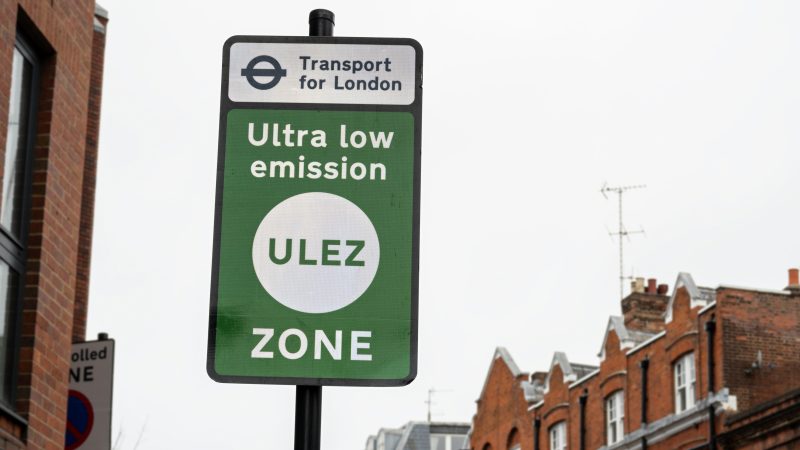
In the month or so between the Uxbridge by-election and Monday’s expansion of the ultra-low emission zone (ULEZ) in London, there has been a constant drumbeat of demands from inside and outside the party to end the ‘war on motorists‘.
ULEZ has been the lightning rod, but defenders of the car won’t stop there: they also want to obstruct additional congestion zones elsewhere in the country and delay the zero emissions vehicle (ZEV) mandate, which would end the sale of new petrol and diesel cars by 2030.
The worst-off are considerably less likely to drive
Though this is partly driven by political expediency, addressing the high perceived cost of driving in the midst of a cost-of-living crisis is a point of principle for some. Labour MPs have voiced concerns that new costs will fall most heavily on those least able to afford them.
That isn’t really true: the worst-off are considerably less likely to drive. 38% of the poorest fifth of households in the UK have no car at all, while richer families are more likely to own second or third vehicles. Last year, the average person in the poorest fifth in England drove less than half as many miles as one in the richest quintile.
Moreover, the notion that motorists have been hard done by is hard to square with the government’s unwillingness to raise fuel duty – at a cost approaching £100bn to the exchequer and set to hit £188bn by 2028.
Labour supported this policy last year, despite it disproportionately benefiting the better off, with the top fifth of earners pocketing twice as much in savings as the bottom 20%. As a result, poorer households now face a double whammy due to their greater reliance on underfunded public services that could have benefitted from some of that foregone duty revenue.
In the same period, the country’s central and local governments have spent a combined £122bn of public money on new or existing roads. Given the billions allocated to subsidise motoring costs, it is hard to see where central and local governments have found the money to wage a war on them.
To help the most vulnerable, Labour should prioritise public transport
This is not to say that driving is not expensive. Indeed the practical costs of motoring – including the purchase costs, maintenance and insurance – are a likely reason why those on lower incomes are less likely to drive than their richer neighbours. But government is not the cause. The average English household spends £106.20 per week on motoring, of which only 20% is tax, licensing and fines.
To better protect the most vulnerable, Labour should prioritise public transport, which has suffered disinvestment, even as motorists are shielded from higher costs. One in ten bus routes were cut last year, with a quarter cut in rural areas over the last decade. Rail infrastructure has meanwhile failed to keep up with necessary improvement costs.
This has pushed commuters onto increasingly congested roads. The average person in England made 580 car trips in 2019 compared to just 50 by bus and 33 by rail – an historic low. If Labour doesn’t reverse the trend, things will get even worse; the Department for Transport predicts traffic could increase by 55% and congestion by 85% by 2040.
This comes with further concerns for our air quality, respiratory health and climate commitments. These impacts will fall disproportionately on the same working people that Labour exists to protect.
Labour can help motorists by improving alternatives modes of transport
Those concerned about the cost of motoring are right that many drivers are vulnerable to rising prices. But that’s not due to government neglect, but because of its misguided attempts to protect them.
If Labour really wants to help motorists, it needs to take away the security blanket. Freezes to fuel duty have failed to take the edge off high motoring costs, while delaying the ZEV mandate will cost drivers more at the pump in the long run, since electric cars tend to be cheaper to run.
Instead, Labour should protect the value of fuel duty and impose congestion charges in the short run and explore road pricing initiatives which could provide a sustainable source of funding in the long run.
This money should be spent on improving alternative modes of transport including bus and rail, ultimately decreasing the cost of transport for the poorest. Additional revenue could also mitigate the higher up-front costs of zero emissions vehicles, either through government subsidies as offered in the US or social leasing schemes recently developed in France.
Labour can help car owners, but it’s not by caving to the demands of those scaremongering about a ‘war on the motorist’. It’s by making cheaper and more efficient alternatives available. Only then can motorists drive forwards.




More from LabourList
‘The hope that kills you’: Reflections from the final day in Gorton and Denton
MPs, union leaders and organisations react to ‘bruising’ Gorton and Denton result
A gory night for Labour